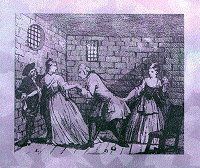Benjamin Britten's 1948 The Beggar's Opera is ripe for revaluation; it had a mixed reception in its day and seems one of only a few of his works not available in the R.E.D. CD catalogue; was it ever recorded?Next of his stage works after The rape of Lucretia, his first chamber opera, Britten's version is accompanied by quintets of strings & wind, harp, percussion, which tend to treat set pieces 'with an almost Baroque consistency' (New Grove). That august encyclopaedia goes on to spare but a single sentence for The Beggar's Opera, albeit an apt one; 'it uses the same instrumental forces to surround the original arias with a wealth of exuberant or pathetic detail; sometimes they are built into spans that transcend the nature of the musically unpretentious 'ballad opera' '.
The programme reminded us that John Gay's The Beggar's Opera was performed more than any other piece in the eighteenth century and had at least one production every year between 1728 and 1886. That makes it, perhaps, less surprising that Seen&Heard has reviewed four of the five versions seen in London during its own first year [April 2000 The Villains' Opera at National Theatre; December 1999 Broomhill Opera (Lloyd); October 1999, Bridewell Theatre]. (I believe readers will find comparisons interesting by navigating these three links.)
Whilst the factual background about Gay's models for his opera, Jack Sheppard and the 'Thief-taker General' Jonathan Wild, was explained, no history was given of the various versions and recent productions, whose distinguished composers have, besides Britten, included Kurt Weill and Jonathan Lloyd.
Over half a century on, you need to listen carefully to catch all Britten's pointed wit in these arrangements. There are many references and allusions to be picked up, with echoes and pre-echoes of his own music and that of others. Some of the tunes, which are often finished no sooner than just begun, remind one closely of his numerous Folk Song settings, with the additional pleasure of the shrewd and cunning instrumentation, which often brings a smile. There is sentiment for the two distressed 'wives', aggressive venom for their manipulative fathers, and grotesquerie for some of the older female characters. The chorus, mostly deployed rather statically as observant bystanders, are brought in for more extensive items.
It is a tricky piece to stage and can easily fall flat. The Guildhall did commendably, though the acting could sometimes have done with more pace and projection. The orchestra was fine under Jason Lai's conducting. Andrew Rees swaggered and sang well as Macheath, always able to wriggle out of a tight situation. Peter Grant and Hakan Vramsmo were duly masterful and sinister as the mercenary fixers who used everyone else as their puppets, bribing or hanging as needed to fill their own pockets and Jenny Carlstedt and Sally Matthews sang well and were properly differentiated, the one affecting to be genteel, the other street-wise from her home life in prison as the gaoler's daughter, both ready to join in a scrap with no holds barred. Everyone managed the sudden transitions between drama and song smoothly.
The show began with a lively eruption of the 'beggars' into the Figaro overture, and with a genuinely scary tumble into the orchestra pit. We did not stay for the last quarter hour; shortly before Captain Macheath was due for his reprieve, and the opera its happy ending, the theatre was suddenly cleared for a fire alarm, with the Captain still in chains!
There are two more performances, with Howard Kirk as Captain Macheath on 19 June and Andrew Rees again on 21st, starting at 7 o'clock.
Peter Grahame Woolf

 Return to:
Return to: